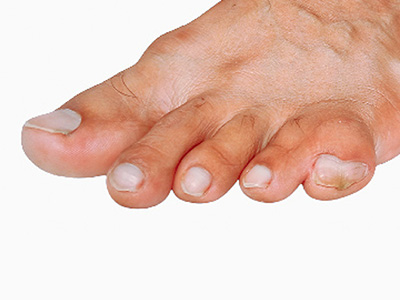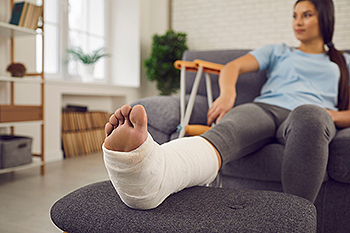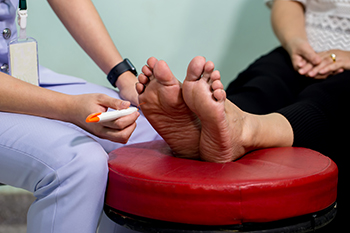
Webbed toes, or syndactyly, occur when two or more toes are fused together due to incomplete separation during fetal development. This condition is largely congenital but in some cases can form without a known cause. Webbing can vary from a simple fusion of skin and soft tissue to a more complex connection involving bones or joints. Webbed toes do not always affect function or mobility, but surgical correction may be considered if there is pain, limited movement, or for cosmetic reasons. The surgical approach depends on the severity and type of fusion involved. Recovery may include casting and bracing to promote proper healing. A podiatrist can evaluate the extent of the toe webbing and provide guidance on surgical options if needed. Early intervention can ensure better outcomes and reduce potential complications. If your child has a toe deformity, it is suggested that you schedule an appointment with a podiatrist for treatment.
Congenital foot problems require immediate attention to avoid future complications. If you have any concerns, contact Dr. Mark Gagnon of Advanced Podiatry. Our doctor can provide the care you need to keep you pain-free and on your feet.
Congenital foot problems are deformities affecting the feet, toes, and/or ankles that children are born with. Some of these conditions have a genetic cause while others just happen. Some specific foot ailments that children may be born with include clubfeet, polydactyly/macrodactyly, and cleft foot. There are several other foot anomalies that can occur congenitally. What all of these conditions have in common is that a child may experience difficulty walking or performing everyday activities, as well as trouble finding footwear that fits their foot deformity. Some of these conditions are more serious than others. Consulting with a podiatrist as early as possible will help in properly diagnosing a child’s foot condition while getting the necessary treatment underway.
What are Causes of Congenital Foot Problem?
A congenital foot problem is one that happens to a child at birth. These conditions can be caused by a genetic predisposition, developmental or positional abnormalities during gestation, or with no known cause.
What are Symptoms of Congenital Foot Problems?
Symptoms vary by the congenital condition. Symptoms may consist of the following:
- Clubfoot, where tendons are shortened, bones are shaped differently, and the Achilles tendon is tight, causing the foot to point in and down. It is also possible for the soles of the feet to face each other.
- Polydactyly, which usually consists of a nubbin or small lump of tissue without a bone, a toe that is partially formed but has no joints, or an extra toe.
- Vertical talus, where the talus bone forms in the wrong position causing other bones in the foot to line up improperly, the front of the foot to point up, and the bottom of the foot to stiffen, with no arch, and to curve out.
- Tarsal coalition, when there is an abnormal connection of two or more bones in the foot leading to severe, rigid flatfoot.
- Cleft foot, where there are missing toes, a V-shaped cleft, and other anatomical differences.
- Macrodactyly, when the toes are abnormally large due to overgrowth of the underlying bone or soft tissue.
Treatment and Prevention
While there is nothing one can do to prevent congenital foot problems, raising awareness and receiving neonatal screenings are important. Early detection by taking your child to a podiatrist leads to the best outcome possible.
If you have any questions please feel free to contact one of our offices located in Crestwood, Orland Park, and Summit, IL . We offer the newest diagnostic tools and technology to treat your foot and ankle needs.

Severe ankle fractures often require surgery to restore stability and function. When a fracture affects the ankle in multiple areas, such as with bimalleolar or trimalleolar fractures, surgery is typically needed to properly realign the bones. Bimalleolar fractures involve injuries to both the inner and outer bones of the ankle. Trimalleolar fractures also include an injury to the back of the tibia near the ankle joint. These complex fractures lead to joint instability, making non-surgical treatment less effective. Symptoms like significant pain, swelling, and difficulty bearing weight often accompany these injuries. A podiatrist can diagnose the severity of an ankle fracture using imaging tools to determine if surgery is necessary to stabilize the ankle and prevent complications like arthritis. If you have severe ankle pain, it is suggested that you schedule an appointment with a podiatrist for a diagnosis and treatment.
Broken ankles need immediate treatment. If you are seeking treatment, contact Dr. Mark Gagnon from Advanced Podiatry. Our doctor can provide the care you need to keep you pain-free and on your feet.
Broken Ankles
A broken ankle is experienced when a person fractures their tibia or fibula in the lower leg and ankle area. Both of these bones are attached at the bottom of the leg and combine to form what we know to be our ankle.
When a physician is referring to a break of the ankle, he or she is usually referring to a break in the area where the tibia and fibula are joined to create our ankle joint. Ankles are more prone to fractures because the ankle is an area that suffers a lot of pressure and stress. There are some obvious signs when a person experiences a fractured ankle, and the following symptoms may be present.
Symptoms of a Fractured Ankle
- Excessive pain when the area is touched or when any pressure is placed on the ankle
- Swelling around the area
- Bruising of the area
- Area appears to be deformed
If you suspect an ankle fracture, it is recommended to seek treatment as soon as possible. The sooner you have your podiatrist diagnose the fracture, the quicker you’ll be on the way towards recovery.
If you have any questions, please feel free to contact one of our offices located in Crestwood, Orland Park, and Summit, IL . We offer the newest diagnostic and treatment technologies for all your foot care needs.

Peripheral neuropathy caused by diabetes affects the nerves in the feet and can lead to a variety of uncomfortable or extremely painful sensations. People with diabetic peripheral neuropathy may experience numbness, tingling, or a burning feeling in their feet. In some cases, they may notice sharp, shooting pains that occur suddenly. These symptoms can make walking difficult and increase the risk of balance issues or falls. Nerve damage can also make it hard to detect injuries, leading to foot sores or blisters that go unnoticed. Without proper sensation, even minor injuries can become serious if left untreated, leading to infection or gangrene. A podiatrist plays an important role in managing peripheral neuropathy by diagnosing the condition, offering treatment options to alleviate pain, and helping prevent further complications. If you have foot pain caused by neuropathy, it is suggested that you schedule an appointment with a podiatrist for a diagnosis and treatment.
Neuropathy
Neuropathy can be a potentially serious condition, especially if it is left undiagnosed. If you have any concerns that you may be experiencing nerve loss in your feet, consult with Dr. Mark Gagnon from Advanced Podiatry. Our doctor will assess your condition and provide you with quality foot and ankle treatment for neuropathy.
What Is Neuropathy?
Neuropathy is a condition that leads to damage to the nerves in the body. Peripheral neuropathy, or neuropathy that affects your peripheral nervous system, usually occurs in the feet. Neuropathy can be triggered by a number of different causes. Such causes include diabetes, infections, cancers, disorders, and toxic substances.
Symptoms of Neuropathy Include:
- Numbness
- Sensation loss
- Prickling and tingling sensations
- Throbbing, freezing, burning pains
- Muscle weakness
Those with diabetes are at serious risk due to being unable to feel an ulcer on their feet. Diabetics usually also suffer from poor blood circulation. This can lead to the wound not healing, infections occurring, and the limb may have to be amputated.
Treatment
To treat neuropathy in the foot, podiatrists will first diagnose the cause of the neuropathy. Figuring out the underlying cause of the neuropathy will allow the podiatrist to prescribe the best treatment, whether it be caused by diabetes, toxic substance exposure, infection, etc. If the nerve has not died, then it’s possible that sensation may be able to return to the foot.
Pain medication may be issued for pain. Electrical nerve stimulation can be used to stimulate nerves. If the neuropathy is caused from pressure on the nerves, then surgery may be necessary.
If you have any questions, please feel free to contact one of our offices located in Crestwood, Orland Park, and Summit, IL . We offer the newest diagnostic and treatment technologies for all your foot care needs.

